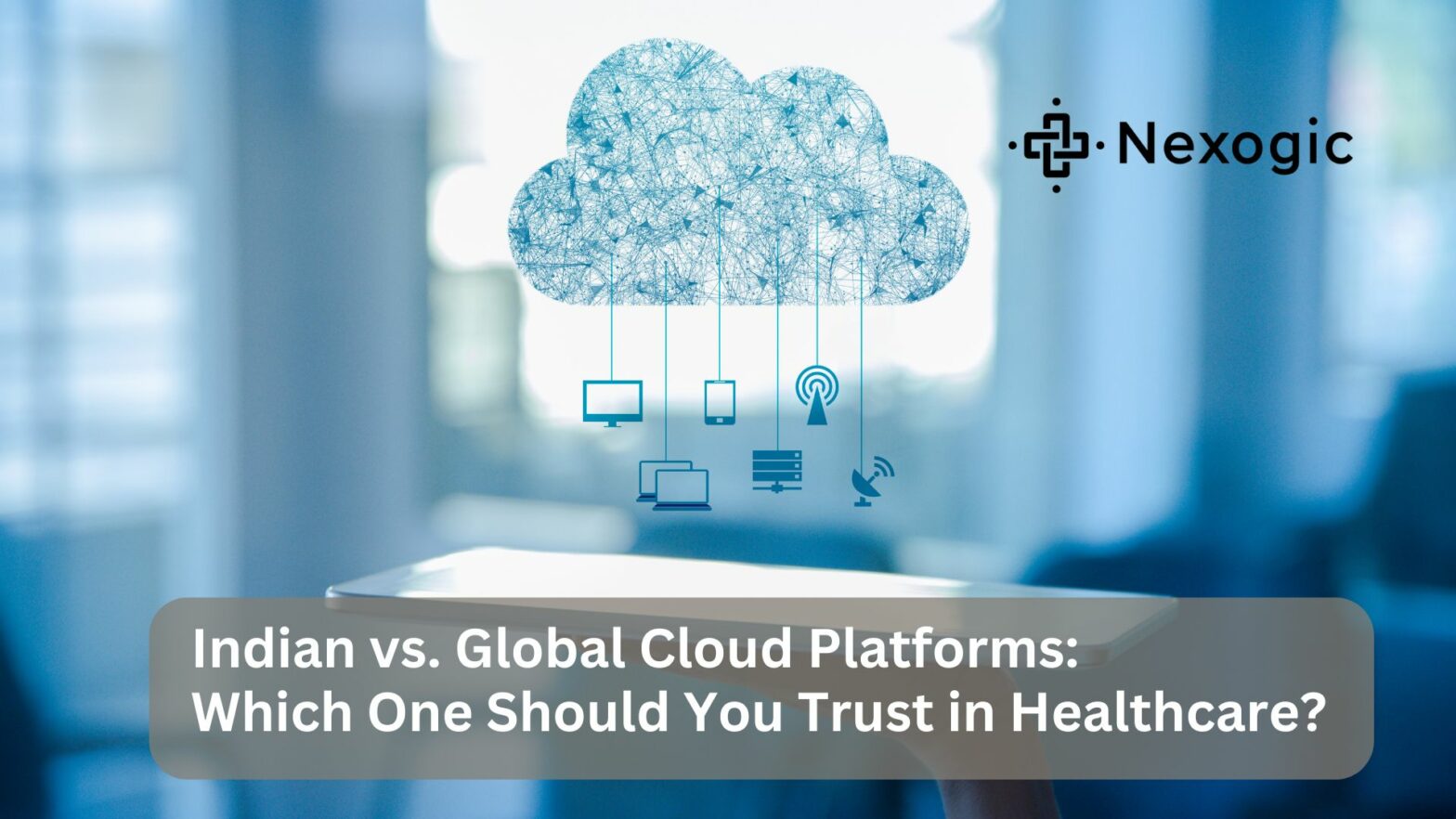Indian vs. Global Cloud Platforms: Which One Should You Trust in Healthcare?
- April 29, 2025
- Nexogic

Indian vs. Global Cloud Platforms: Which One Should You Trust in Healthcare?
The healthcare industry is undergoing a digital transformation like Cloud Platforms never before electronic health records, telemedicine, health analytics, AI diagnostics, and more are driving this revolution. At the core of this transformation lies one vital question:
Where should healthcare data be stored and processed on an Indian cloud platform or a global one?
In an industry where data sensitivity, security, and compliance are non-negotiable, the choice of a cloud provider is more than just a tech decision it’s a strategic move. Let’s explore the pros and cons of both Indian and global cloud platforms in a healthcare context.
Why Cloud Matters in Healthcare
Before we dive into the comparison, here’s why cloud computing is crucial for healthcare:
Real-time access to patient data and medical histories
Scalability for handling massive health records and imaging data
Security & Disaster Recovery for critical medical information
Interoperability between systems and devices
AI & Analytics for predictive care and diagnosis
Global Cloud Platforms in Healthcare
Amazon Web Services (AWS), Microsoft Azure, and Google Cloud dominate the cloud industry. They also offer specialized healthcare-focused services such as:
HIPAA-compliant solutions
AI for medical imaging and predictive analytics
Global health data exchange platforms
FHIR support (Fast Healthcare Interoperability Resources)
Pros of Global Cloud Platforms
Advanced Security & Compliance Tools: ISO 27001, HIPAA, GDPR-ready environments
Scalability: Ideal for hospital networks, healthtech startups, and global diagnostic chains
Innovation & AI Integration: Sophisticated tools for disease prediction, medical imaging, and clinical data analysis
Cons to Consider
Data Residency Concerns: Hosting sensitive patient data outside India can lead to regulatory issues
High Cost for Smaller Clinics or Startups
Limited Control Over Data Jurisdiction
Indian Cloud Platforms in Healthcare
Indian providers like CtrlS, NxtGen, ESDS, and Netmagic are carving out a strong niche in the healthcare space, especially among local hospitals, diagnostic labs, and telehealth platforms.
Pros of Indian Cloud Platforms
Data Localization: Full compliance with Indian regulations (including RBI, MeitY, and CERT-IN)
Personalized Support: Easier to connect, consult, and resolve issues in real-time
Cost-Effective Models: Especially useful for clinics, small hospitals, and regional health startups
Strong Physical Data Center Presence in Indian cities like Mumbai, Bengaluru, Hyderabad, and Delhi
Limitations
Fewer Advanced AI/ML Tools
Less Global Infrastructure
May Lack Mature Ecosystems compared to AWS or Azure
Which One Should You Trust?
Choose Global Cloud Providers if:
You’re building a global healthtech product or SaaS platform
You need sophisticated AI tools or cross-border healthcare access
operations may span on multiple countries and it requires global compliance
Choose Indian Cloud Providers if:
You’re focused on the Indian healthcare market
Data localization and government compliance are top priorities
You want affordable, reliable service with strong local support
Why Not Go Hybrid?
Multi-cloud model is one of the growing trends in healthcare. For instance:
Store sensitive patient data in Indian cloud platforms for compliance.
Use global platforms for AI-driven analytics, diagnostics, or mobile app infrastructure.
This way, you get security plus innovation without compromising regulatory obligations.
Final Thoughts
In healthcare, trust is everything especially when it comes to storing and managing critical health data. Whether you choose an Indian or global cloud platform, ensure your provider supports:
End-to-end data encryption
Compliance with Indian and global regulations
Scalability as your operations grow
Disaster recovery & business continuity planning
Ultimately, the right platform should not only support your tech stack but also align with your ethics, compliance needs, and patient-first mindset.
Have you worked with cloud platforms in healthcare? Got questions or experiences to share? Let us know in the comments.


